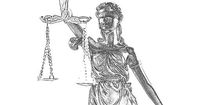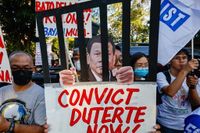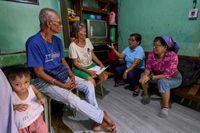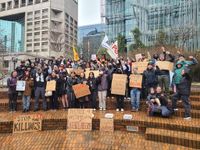On March 11, 2025, former Philippine President Rodrigo Duterte was arrested at Manila’s Ninoy Aquino International Airport, marking a dramatic moment in the Philippines’ ongoing saga of the war on drugs which claimed as many as 30,000 lives. His arrest, executed under a warrant from the International Criminal Court (ICC), has ignited a complex mixture of relief and skepticism among Filipinos and human rights advocates worldwide.
For years, Duterte’s violent anti-drug campaign drew fierce condemnation globally, with human rights organizations alleging widespread extrajudicial killings. As President from 2016 to 2022, Duterte maintained that the state was merely defending citizens against drug threats, while countless families mourned the loss of loved ones. Critics point out that this campaign extended well beyond drug users to encompass dissidents, activists, and any perceived government critics. In light of this context, many see the ICC’s actions as a necessary step toward accountability.
Protests erupted across the globe following Duterte’s arrest. A significant mobilization occurred in Quezon City, Philippines, on March 14, where a crowd rallied demanding justice for the victims of Duterte's presidency, demonstrating the enduring impact of his policies. Individual stories from families of victims encapsulate the depth of loss felt within society. "Almost every one of the families Rise Up serves who lost loved ones to Duterte's so-called 'war on drugs' recounted how they cried when they heard the news [of his arrest]," stated Rebecca K. Lawson, media liaison for Rise Up for Life and for Rights.
Lawson's sentiments echo a wider chorus of supporters who express both hope and caution regarding the ICC's ability to deliver justice. "This arrest is just another step along the way," she remarked, highlighting that legal battles are expected to be prolonged and fraught with challenges. Duterte's actions led to a climate of fear among many families, who continue to grapple with the aftermath of his policies.
The International Criminal Court had previously investigated these alleged atrocities and concluded that Duterte’s war on drugs violated international humanitarian law. United Nations Special Rapporteur Irene Khan had visited the Philippines in early 2024, calling for the immediate abolishment of the National Task Force to End Local Communist Armed Conflict (NTF-ELCAC), which was notorious for targeting activists under the guise of anti-communism.
Phillipine President Ferdinand Marcos Jr. responded to the ICC’s arrest warrant by stating his administration had no choice but to comply. However, many believe his motivations were politically charged, aiming to diminish the power of Duterte, whose family remains a formidable political dynasty in the Philippines. Marcos Jr.'s assertion that they were honoring international obligations is met with skepticism, reflecting the ongoing struggle for power within the landscape of Philippine politics.
On an international scale, responses to Duterte’s arrest have varied. The Trump administration had once criticized the ICC, even issuing executive orders to prevent it from prosecuting U.S. officials. With Trump’s return to public life, observers noted his silence on Duterte’s arrest, an interesting departure from his previous stances.
Conversely, China rallied in support of Duterte, warning the ICC against politicizing its actions. This reaction highlights the geopolitical complexities that often accompany high-profile international cases. Given the ICC's limited record of convictions—just six since its inception in 2002—the skepticism about its impact is palpable.
Simultaneously, reactions from Filipino civil society underscore a critical desire for reform and accountability. Activists in Portland, Oregon, gathered to advocate for justice, demanding that not only Duterte but also those who supported his regime confront the full consequences of their actions. Groups like BAYAN and Malaya Portland rallied under slogans like “Prosecute and imprison Duterte” and emphasized the need for accountability from the current government.
Activists like attorney Ephraim B. Cortez, who leads the National Union of People’s Lawyers, highlighted that this moment represented not just justice for Duterte's victims but a pivotal shift in the country's quest for accountability. “We see the issuance and the implementation of the warrant of arrest as the beginning of their long and arduous journey to seek accountability,” he stated, giving voice to the aspirations of many who dream of a just resolution.
The warming reception to the ICC's actions suggests that there remains a collective yearning within the Philippines for a justice system that serves rather than oppresses. Filipino leaders, both religious and civic, have echoed these sentiments, emphasizing the importance of transparency and accountability. “As proud United Methodists, we need to ‘Padayon!’ — to move forward,” stated retired Bishop Rodolfo A. Juan.
Despite the developments, significant obstacles remain. Lawson pointed out, "The police were the perpetrators in many cases, and their reports often justify the killings instead of investigating them,” illustrating the systemic challenges that advocates face in their pursuit of justice. Political and economic hardships exacerbate the difficulties, leaving many families terrified to pursue leads or testify against former officials.
As the International Criminal Court progresses with the case against Duterte, global and local observers alike remain cautious yet hopeful. Many understand that while Duterte’s arrest is a pivotal moment, it is merely the onset of what promises to be a lengthy legal battle that could reshape human rights accountability in the Philippines. Fulfilling this quest for justice demands not just perseverance but also a united front against those who perpetuate policies infringing on human rights.







